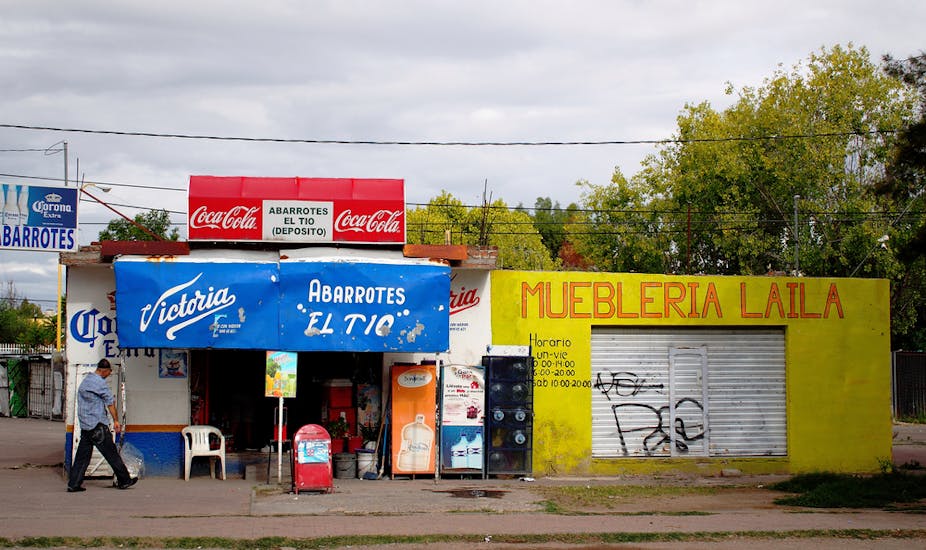One of the main talking points from the recent UK Budget, was the announcement of a tax on sugary soft drinks. But Mexico already has a sugar tax. So what do we know about its impact? And what can Britain learn from it?
As with Mexico, Britain has been struggling with a very fat problem. The difference is that Mexico dared to take the first step towards taxing sugary drinks. The journey has been turbulent, but recent research seems to show that progress has been made.
Mexico is a country where the sugar-sweetened beverage industry has penetrated and changed the core of Mexican culture. Cherished for its rich nutritional value, the traditional Mexican diet is composed of abundant fruit and vegetables, whole grains, pulses and spices.
The everyday bread in Mexico has always been the tortilla. Traditionally produced from corn grown in “milpas” – an environmentally sustainable agricultural system in which corn, beans and squash grow symbiotically – the tortilla now has a great rival: fizzy drinks.
From being a healthy country, today 71% of Mexico’s adult population is overweight or obese. What’s more, sugary drinks contribute 70% of the added sugar in the Mexican diet. In 2012, an average Mexican drank 163 litres of sugar-sweetened drinks a year.
A nation’s diet transformed
The beverage industry entered Mexico and conquered its population by providing free refrigerators to restaurants, taco joints and family run corner stores. Available even in the most remote parts of Mexico, fizzy drinks transformed the diet and the health of the nation.
Faced with overwhelming obesity rates, in January 2014 Mexico became one of the first countries in the world to impose a tax on sugary drinks. The tax was imposed on any beverages with added powder, syrup, flavour extract, sugar or caloric sweeteners. Fizzy drinks, energy drinks, bottled tea and coffee, fruit juice and any fruit-flavoured drink with added sugar were all taxed at the rate of one Mexican peso (about £0.04) per litre.
The world has had Mexico under observation since. And in January 2016, the Instituto Nacional de Salud Pública in Mexico and the University of North Carolina published in the BMJ their first analysis of the effects of the sugar tax there. The results looked promising.
What the BMJ report revealed
On average, a 6% drop in sugary drink purchases was achieved in 2014. By the end of 2014, a 12% fall had occurred. Among the poorest households, the annual average sale of sugary drinks dropped by 9% and by December 2014, sales had decreased by 17%. Sales of bottled water and beverages with no added sugar increased by 4%.

In 2015, annual sales decreased from 163 litres to 137 litres per capita. The estimated revenue from a 10% tax on sugary drinks is 15.4-16.0 billion pesos (about £639m). It has been estimated that the reduction in sugary drink consumption will reduce the number of people who are overweight or obese by 1% (this estimate is based on a baseline of 163 litres intake per person).
The industry says that by taxing food, poor people will be affected. This is true. The recent research in Mexico points to a greater decrease in sugary drink purchase in poor communities, which is to be welcomed. Although obesity is currently more common among the more affluent in society, poorer people generally have worse health and less access to healthcare, as well as lower disposable income.
Although it’s too early to know if overall sugar consumption has gone down, the results so far show that the tax could potentially reduce inequalities if it improves health behaviours among poorer communities and encourages spending on healthier – or less unhealthy – products. It may even prevent the shift that has been seen in most countries, where the highest obesity prevalence flips from the more affluent to the poorer sectors of society. Spending less on fizzy drinks could mean better health and more money.
Only the beginning
If the UK and other countries want to reduce the prevalence of metabolic diseases, governments need the tax to be about health and not money. A negative aspect of the sugary beverage tax in Mexico is that the revenue raised is not being directed to the prevention of obesity. So where is it going?
Since the North American Free Trade Agreement (NAFTA) in 1994, the availability of fizzy drinks and junk food in convenience stores and other food outlets in Mexico has increased dramatically. My current research studies the association of the density and proximity of the different types of food outlets (the food environment) and obesity in Mexico. Could the strategic presence of food outlets be triggering fizzy drinks intake and metabolic disease in Mexico?
The world economy favours the accessibility of cheap and highly processed foodstuffs that have little or no nutritional content (sugary drinks being the best example). Tackling metabolic disease needs an integrated approach and the sugar tax is only the beginning. Greater efforts are required to restructure the food environment, increasing the availability of healthy foods and making the healthy option the easy option.

